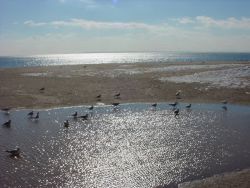Brighton Playground
Brighton Playground
This playground is located at Brighton 2nd Street, Brightwater Court, and the Boardwalk in the Brighton Beach neighborhood of Brooklyn. In 1868 entrepreneur William A. Engeman began to purchase land in the area and transformed a tract of marsh land and sand dunes into fairgrounds, hotels, and a bathing pavilion. In 1878 the area was named Brighton Beach for Britain’s well-known resort on the English Channel. The Hotel Brighton, the Ocean Hotel, the Brighton Beach Racetrack, and the Brighton Beach Baths (built on the site of a former amusement park) attracted visitors to a middle-class resort destination just east of the more boisterous West Brighton and Coney Island amusement areas.
By the early 20th century, express subway service to Manhattan made Brighton Beach a popular location for year-round residences. Developers built colonies of bungalow houses and dozens of six-story apartment buildings in the area. Thousands of Jews from Brownsville, East New York, and the Lower East Side as well as Italian-Americans, moved to Brighton Beach during the first half of the century; they were joined by immigrants from the Ukraine, China, India, Pakistan, and Vietnam after the Second World War.
The City of New York acquired this property in 1946 and assigned it to Parks four years later. The playground was built in 1950 as part of the Coney Island improvement program. Through beach expansion and boardwalk renovations, construction of housing and recreational facilities, the large projects dramatically changed the character of Coney Island. In 1954 Parks Commissioner Robert Moses proclaimed that as a result of the construction, "This fabulous neighborhood, known throughout the world, will be one of the most desirable residential neighborhoods in the city, served by the finest oceanfront recreation area in the world."
In 1995 Council Member Howard L. Lasher funded the $1,053,000 reconstruction of Brighton Playground. Improvements made in 1997-98 included the installation of new handicapped-accessible play equipment, basketball courts, benches, handicapped-accessible picnic tables, game tables, fences, water fountain, and wheelchair-accessible ramps to and from the boardwalk. The playground was outfitted with new drainage and water supply systems, and a yardarm was attached to the flagpole. As part of the playground improvement, five beach wheelchairs were purchased for physically challenged users.
The playground design was inspired by the amusements and marine life of Coney Island. Sea creatures from starfish to dolphins adorn the steel panels at entrances to the playground and to the play equipment. Colored pavement decorated with seashells and a compass rosette surround the flagpole. The spray shower features stainless steel arches with panels that salute Coney Island’s three most famous amusement parks.
In the southeast corner of the playground, the commemorative garden honors the memory of Chiune "Sompo" Sugihara (1900-1986), the brave Japanese diplomat who served as Vice Consul to Lithuania during the Holocaust. By signing unauthorized visas in the summer of 1940, he risked his life and ruined his career to save more than 10,000 Jews.
The garden features Japanese Flowering Cherry Trees, Japanese Shore Rose shrubs, and Montauk Daisies (a chrysanthemum species related to the Japanese national flower). Also planted in the garden and throughout the playground are numerous other tree, shrub, perennial, and grass species tolerant of harsh seaside conditions, such as high winds and salt air. These plants and the many Coney Island motifs beautify Brighton Playground by the sea.
Check out your park's Vital Signs
Clean & Safe
Green & Resilient
Empowered & Engaged Users
Share your feedback or learn more about how this park is part of a
Vital Park System

